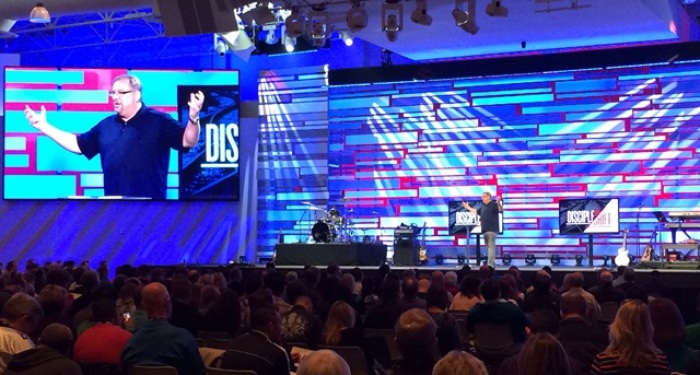Exponential West Conference Inspires Church Leaders to Multiply Disciples to 'Empty Hell, Fill Heaven'

During the second and third days of the Exponential West conference this week, speakers shared five discipleship essentials and encouraged church leaders to train and equip their flock to go out into the world to share the Gospel in order to empty hell and fill heaven.
Pastor Rick Warren, whose Saddleback Church in Lake Forest, Calif., hosted the three-day conference that was attended by 2,000 church planters, spoke about multiplying and exponentially reproducing disciples. The four core ingredients he said are necessary to make disciples are: having a disciple-making pastor; having a disciple-making ministry at church; using the method of Jesus as the process; and lastly, pain, problems and persecution.
Warren noted that no one wants pain, problems and persecution, but quoted from Acts 14:21-22 and said that believers, "enter into the kingdom through much suffering."
He then emphasized that pastors and church planters must do more than simply teach the Word, adding that growth is a choice and spiritual maturity is a process. He said that maturity isn't measured by beliefs but by behaviors, and how people act at home and at work, and the habits they develop. Warren said that, in reality, Christians only believe in the parts of the Bible that they do, which become their habits.
To explain this he said, "You don't believe in forgiving your enemies unless you do it." And added that "partial faithfulness is unfaithfulness and partial obedience is disobedience."
Warren also stated that believers cannot grow simply by attending church or by acting alone, but rather growth develops in-community and by letting Christ inhabit their lives.
Church planting
The Rev. Wilfredo "Choco" De Jesus, senior pastor of New Life Covenant in Chicago, Ill., shared the history of his church, which went from 68 members to seven campuses and seven plant churches, including one in Peru and Puerto Rico, and the importance of expanding God's kingdom through church planting.
"We started doing amazing things in the community," De Jesus said, which in turn transformed the 68-member congregation to one where in 2000 held 11 services on Sundays. "Services grew because of outreach, building leaders and go out into the city, state and the world – to multiply to reach the world for Jesus Christ to the glory of the Lord. Our job is to empty hell and fill heaven, and you cannot do that if everybody is under the same roof."
De Jesus also said that it's time for Americans to get out of the huddle and go out into the world to engage those who are lost; and implored pastor to not "use prayer as a crutch to not do anything," for their communities, but to take action and work relationially to transform people's lives.
As an example, De Jesus spoke about the problem of prostitution in the city of Chicago and shared how through outreach his church has been able to save 252 women from prostitution in the last 10 years, simply by inviting women into the church, hosting a banquet in their honor and sharing Jesus Christ's love for them. Even though the method he uses to reach out to those who are lost is unconventional, he asserted that the methods used to reach people aren't what's sacred; it's the message that's sacred.
The reason why De Jesus emphasizes that pastors and church leaders should be less concerned about growing the numbers of their church than equipping disciples to go out into the community and the world, is because one individual cannot reach everyone who needs to be saved.
"You cannot reach them all. You have to empower other people to do it," he said, encouraging pastors and church planters to dream beyond their capabilities. "America needs the Gospel and church bodies that care more about the poor not about tithes, positions and numbers."
He continued, "There's much more you can do if you're willing to give it away and empower other people to do the work of God and birth another church. God honors that—when you think about kingdom work and not just your own work."
Michael Frost, director of the Tinsley Institute, the mission study center at Morling College in Sydney, Australia, was the last speaker at the 10-session conference on discipleship and posed one question to the pastors: "To whom did you get sent?" He commented that if church leaders cannot answer that question, then they're not equipped to make disciples.
"You cannot make sent disciples unless you identify as a sent one," Frost said. "We are sent into the world to bring glory to God's name."
Frost added that the mission of God's people is to "alert everyone, everywhere to the universal reign of God through Christ. To go out into the world to share the Gospel with people who have not yet been set free by the truth."
According to Frost, "Just growing bigger and bigger churches isn't actually telling people what the reign of God looks like. But feeding the poor does; befriending the lonely does."
He then said that if pastors were to go out into the streets and ask Americans what they think about the reign of God by looking at the church, "you shudder to think what they would say, don't you? he asked.
Others speakers at Wednesday and Thursday sessions at the Exponential West conference include: Dori Gorman, Lance Ford, Caesar Kalinowski, Chris Hodges, Gene Appel, Larry Osborne, Dave Ferguson, Efrem Smith, Jeff Vanderstelt, Miles McPherson, Brandon Hatmaker, Laurie Beshore, Hugh Halter, Matt Larson, Neil Cole, Jon Ferguson and Dave Ferguson.





























